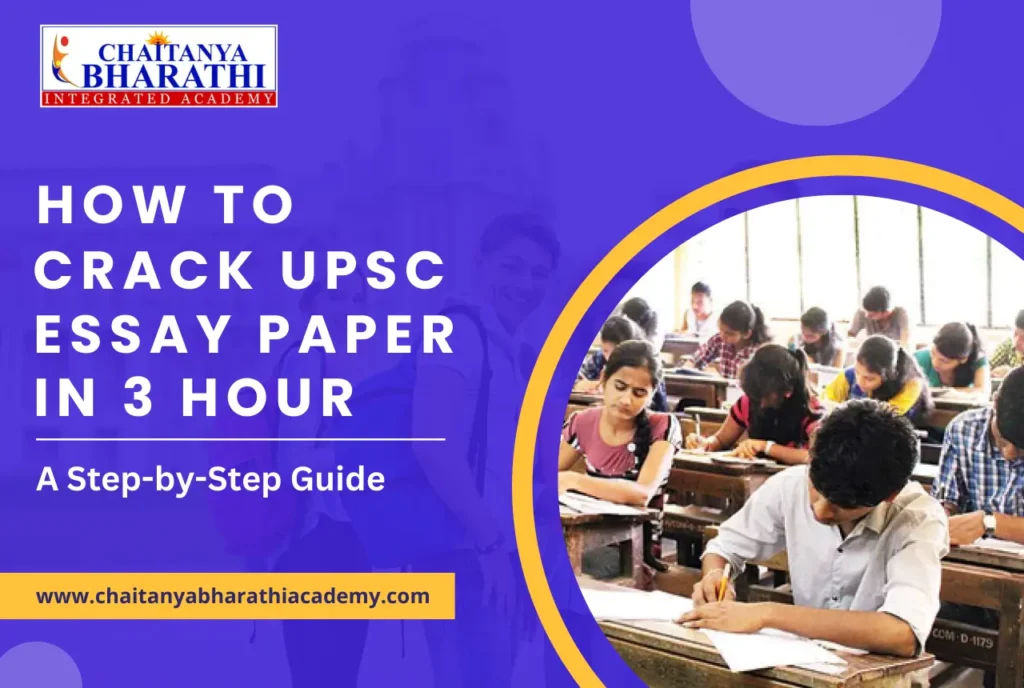Are you preparing for the Civil Service Exams? Then how to crack the UPSC essay paper would be a question that you are worried about, worry not! In this guide, we will look into the tactics you can employ to ace your UPSC CSE Mains Essay Paper easily.
The UPSC Civil Services Examination (CSE) is the sure-shot gateway towards getting into prestigious administrative positions in the nation. Due to its high-ranked officer-level jobs, UPSC is the most competitive exam in India (maybe in the world), and once you have conquered the prelims, the mains essay paper is the passing paper that one needs to ace or at least get the qualifying marks to get to the final round of interviews. Therefore, holds significant weight, potentially influencing your final score and your dream career.
The difficulty resides in the creation of well-organized, insightful essays within a constrained three-hour timeframe. However, there is no need for concern This critical component of the CSE can be effectively addressed through a well-organized strategy. This detailed guide will provide you with the necessary strategies and resources to achieve success in the UPSC essay paper.
By following this comprehensive guide and diligently practicing, you’ll be well on your way to conquering the UPSC essay paper and securing your place in the coveted ranks of civil service aspirants.
How to Crack UPSC Essay Paper in 3 Hours?
Pre-Exam Preparation
The UPSC essay examination is a substantial challenge for UPSC aspirants to complete within the three-hour time limit. Nevertheless, you can confidently confront this challenge by employing a well-organized strategy and meticulous preparation. The establishment of a robust knowledge base is the cornerstone of your success.
Here’s how you can prepare for the UPSC essay paper beforehand:
- Cultivate a Strong Knowledge Base:
- Stay Informed on Current Affairs: Develop a habit of reading newspapers like The Hindu, The Indian Express, and Yojana magazine to stay abreast of current events, government policies, and socio-economic issues.
- Master General Studies Topics: The UPSC syllabus encompasses a vast array of topics. In-depth knowledge of subjects like History, Polity, Economics, Science & Technology, and Geography is essential for crafting well-rounded essays.
- Sharpen Analytical Thinking: The UPSC essay paper assesses your ability to analyze complex situations, identify relationships between different aspects of an issue, and arrive at logical conclusions. Regularly practicing answer writing for UPSC mains question papers from previous years can hone these analytical skills.
- Develop Your Writing Style:
- Maintain a Repository of Quotes, Facts, and Statistics: Compile a collection of thought-provoking quotes, relevant facts, and insightful statistics on various topics. This treasure trove of information will serve as a valuable resource when crafting your essays.
- Practice Essay Writing Regularly: Regular essay writing practice is paramount to mastering the art of structuring arguments, presenting a balanced perspective, and adhering to the word limit. Aim to write essays within the 300-400 word range using previous UPSC essay paper topics.
- Time Management is Key: Develop a time management strategy that allocates specific time slots for the introduction, body paragraphs, and conclusion of your essay. This will ensure you complete your essay within the stipulated time frame.
By adhering to these pre-exam preparation strategies, you will be adequately prepared to confront the UPSC essay paper with assurance and poise on the day of the examination. In the subsequent section, we will explore specific strategies for composing essays that achieve high scores within the three-hour time frame.
Understanding the UPSC Essay Paper Format
Having familiarized yourself with the format, let’s delve into some practical tips to excel in writing UPSC essays:
- Read and Analyze the Essay Prompt Carefully: Before commencing your essay, meticulously read and understand the crux of the topic. Identify keywords and avoid deviating from the core theme.
- Plan and Structure Your Essay: Don’t jump straight into writing. Develop a structure or outline for your essay. This blueprint will ensure a logical flow of ideas and arguments.
- Craft a Compelling Introduction: Hook the examiner with a captivating introduction that sets the context for your essay. Briefly introduce the topic, mention your thesis statement (central argument), and provide a roadmap of the key points you’ll discuss.
- Develop Strong Body Paragraphs: Each body paragraph should focus on a single argument or point. Use relevant examples, facts, and statistics to substantiate your claims. Ensure proper transitions between paragraphs to maintain coherence.
- Conclude with a Punch: Leave a lasting impression with a strong conclusion that summarizes your main points and reiterates your thesis statement. You can also conclude by mentioning the significance of the topic or suggesting a future course of action.
Following these tips will equip you to write well-structured and insightful essays that effectively demonstrate your understanding of the chosen topics.
In the next section, we’ll explore answer formatting, a crucial aspect of presenting a polished and professional essay.
Choosing the Right Essay Topic.
Planning and Structuring Your Essay.
The UPSC essay examination is a substantial challenge for UPSC aspirants to complete within the three-hour time limit. Nevertheless, you can confidently confront this challenge by employing a well-organized strategy and meticulous preparation. The establishment of a robust knowledge base is the cornerstone of your success.
Here’s how you can prepare for the UPSC essay paper beforehand:
- Cultivate a Strong Knowledge Base:
- Stay Informed on Current Affairs: Develop a habit of reading newspapers like The Hindu, The Indian Express, and Yojana magazine to stay abreast of current events, government policies, and socio-economic issues.
- Master General Studies Topics: The UPSC syllabus encompasses a vast array of topics. In-depth knowledge of subjects like History, Polity, Economics, Science & Technology, and Geography is essential for crafting well-rounded essays.
- Sharpen Analytical Thinking: The UPSC essay paper assesses your ability to analyze complex situations, identify relationships between different aspects of an issue, and arrive at logical conclusions. Regularly practicing answer writing for UPSC mains question papers from previous years can hone these analytical skills.
- Develop Your Writing Style:
- Maintain a Repository of Quotes, Facts, and Statistics: Compile a collection of thought-provoking quotes, relevant facts, and insightful statistics on various topics. This treasure trove of information will serve as a valuable resource when crafting your essays.
- Practice Essay Writing Regularly: Regular essay writing practice is paramount to mastering the art of structuring arguments, presenting a balanced perspective, and adhering to the word limit. Aim to write essays within the 300-400 word range using previous UPSC essay paper topics.
- Time Management is Key: Develop a time management strategy that allocates specific time slots for the introduction, body paragraphs, and conclusion of your essay. This will ensure you complete your essay within the stipulated time frame.
By adhering to these pre-exam preparation strategies, you will be adequately prepared to confront the UPSC essay paper with assurance and poise on the day of the examination. In the subsequent section, we will explore specific strategies for composing essays that achieve high scores within the three-hour time frame.
Understanding the UPSC Essay Paper Format.
The UPSC essay paper tests your ability to analyze complex topics, present well-structured arguments, and communicate effectively. Here’s a breakdown of the key features:
- Structure: The paper is divided into two sections, A and B, with four essay topics in each section. You are required to choose one essay from each section.
- Word Limit: Each chosen essay should be between 1000-1200 words.
- Evaluation Criteria: Your essays are evaluated based on four main criteria:
- Content: Depth of knowledge, relevance to the topic, and logical analysis of arguments.
- Structure: Clear organization, well-developed paragraphs, and a coherent flow of ideas.
- Language: Grammar, vocabulary, clarity, and conciseness of expression.
- Presentation: Neat handwriting and proper formatting (if handwritten) or clean and error-free typing (if using a computer).
Understanding these aspects will ensure you approach the essay paper strategically and craft well-rounded essays that impress the examiner.
Choosing the Right Essay Topic.
Selecting the appropriate essay topic is the first crucial step in excelling in the UPSC essay paper. Here are some key considerations to guide your choice:
- Scrutinize All Options: Don’t rush into selection. Analyze all eight essay topics meticulously, carefully reading and understanding the crux of each one. Identify the keywords and avoid deviating from the core theme of the topic.
- Comfort and Knowledge: Select a topic you are comfortable with and have relevant knowledge about. This will allow you to develop a strong foundation for your essay and confidently showcase your understanding.
- The demand of the Question: Consider the demand of the question. Avoid overly broad topics that might be difficult to cover comprehensively within the word limit. Conversely, steer clear of narrow topics that limit the scope of your arguments.
- Critical Thinking Showcase: Opt for a topic that allows you to showcase your critical thinking and analytical abilities. The ability to analyze complex issues, identify relationships between various aspects, and arrive at logical conclusions is highly valued by examiners.
Writing a Compelling Essay.
Having grasped the importance of topic selection, let’s delve into the process of crafting a compelling essay that will impress the examiner. Here’s a breakdown of the key elements involved:
- Introduction:
- Hook the Reader: Grab the examiner’s attention with a captivating opening sentence or anecdote that sets the context for your essay.
- Define the Scope: Clearly define the scope of the essay by outlining the central theme of the chosen topic.
- Present Thesis Statement: Briefly introduce your thesis statement, which is the core argument you will develop throughout the essay.
- Body Paragraphs:
- Topic Sentence: Each body paragraph should commence with a strong topic sentence that introduces the main point you’ll be elaborating on.
- Evidence and Examples: Substantiate your claims with relevant examples, facts, quotes, and case studies. Ensure the information you include is credible and from reliable sources.
- Balanced Approach: While presenting your perspective, maintain a balanced and objective approach. Acknowledge opposing viewpoints and briefly discuss their merits before presenting your counter-arguments.
- Clarity and Concision: Strive for clear and concise language throughout your essay. Utilize proper sentence structure and grammar to ensure your arguments are easily understood by the examiner.
- How to conclude the essay:
- Summarize Key Points: Conclude your essay by summarizing the key points you’ve discussed throughout the body paragraphs.
- Restate Thesis: Briefly reiterates your thesis statement to leave a lasting impression on the examiner.
- Forward-Looking Perspective: If applicable, conclude by offering a forward-looking perspective on the topic or suggesting potential solutions to address the issue at hand.
By adhering to this framework and integrating these components, you will be well on your way to producing essays that are both impactful and well-organized, and that effectively demonstrate your writing and analytical abilities. The subsequent section will investigate the significance of appropriate answer formatting for the UPSC essay paper.
Time Management Techniques for the UPSC Essay Paper.
Excelling in the UPSC essay paper within the three-hour time limit necessitates adept time management. Some valuable strategies to ensure that you maximize every minute are as follows:
- Strategic Time Allocation: Divide the allotted time strategically. Allocate specific time slots for each section of your essay, including the introduction, body paragraphs, and conclusion. This will prevent you from spending too much time on one section and neglecting others.
- Adherence to Time Limits: Strictly adhere to the time limits you set for each section. Remember, you need to write two complete essays within the three-hour window. Going over the time limit for one essay might force you to rush through the other, potentially compromising the quality of your work.
- Practice Makes Perfect: Develop a sense of pace and focus by practicing writing timed essays under simulated exam conditions. Set a timer for three hours and attempt writing essays on UPSC-style topics within the designated time frame. This will help you gauge your writing speed and familiarize yourself with managing time effectively during the actual exam.
- Buffer Time for Review: Leave approximately 10-15 minutes at the end of the exam to proofread and revise your essays meticulously. This buffer time allows you to identify and rectify any grammatical errors, typos, or factual inconsistencies that might have crept in during the writing process.
By implementing these time management techniques, you’ll gain greater control over the exam and ensure you have sufficient time to craft well-structured and polished essays within the stipulated timeframe. In the next section, we’ll provide valuable insights gleaned from UPSC essay toppers to help you on your UPSC journey.
Additional Tips for Success in the UPSC Essay Paper.
To enhance your prospects of success in the UPSC essay paper and refine your approach, it is recommended that you review the fundamental components of essay writing and time management. The following are a few additional tips:
- Presentation Matters:
- Neat and Legible Handwriting: If opting for a handwritten approach, ensure your handwriting is neat and legible. Poor handwriting can make it difficult for the examiner to evaluate your essay effectively and might lead to a negative impression.
- Headings and Subheadings: Organize your essay for better readability by using proper headings and subheadings. This structure will enhance the flow of your arguments and guide the examiner through the logical progression of your thoughts.
- Emphasis (Sparingly): Underline or highlight key points sparingly to emphasize their importance. Overdoing it can make your essay appear cluttered and distract from the overall content.
- Practice and Focus:
- Handwriting Speed: Regularly practice writing essays by hand to improve your handwriting speed and ensure you can complete your essays within the time limit.
- Calm and Composed: Remain calm and focused during the exam. Anxiety can cloud your judgment and hinder your ability to think clearly. Take deep breaths and approach the essay topics with a positive and confident mindset.
- Content is King:
- Quality over Quantity: While adhering to the word limit, prioritize the quality of your content over excessive quantity. Focus on presenting well-developed arguments supported by strong evidence rather than trying to fill pages with superfluous information.
- Thorough Revision: Before submitting your answer booklet, leave ample time to thoroughly revise your essays. Proofread meticulously for any grammatical errors, typos, or factual inconsistencies. A polished and error-free essay will create a positive impression on the examiner.
By integrating these supplementary suggestions into your preparation strategy, you will be adequately prepared to not only compose well-organized and insightful essays but also to present them in a professional and organized manner. In the subsequent section, we will extract valuable insights from the best scorers of the UPSC essay paper to provide you with additional guidance on your UPSC journey.
Rewind the Importance of UPSC Mains Essay Paper
This guide has provided you with a comprehensive strategy for achieving success in the UPSC essay paper. Recall that success is founded on the principles of strategic time management, a robust knowledge base, and well-honed writing abilities. Practice essay writing consistently, meticulously examine question papers from previous years, and allocate time to the improvement of your time management strategies.
Approach the essay topics with a positive and self-assured attitude on the day of the exam. Emphasize the presentation of well-organized arguments that are substantiated by pertinent evidence, and guarantee that your writing is grammatically correct, concise, and comprehensible.
By following these steps and maintaining unwavering dedication, you’ll be well on your way to conquering the UPSC essay paper and taking a significant step closer to achieving your UPSC dream.












